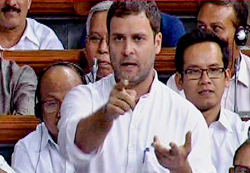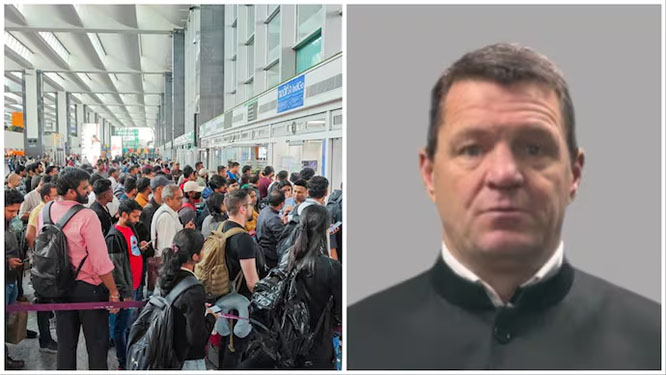New Delhi, Apr 20: Rahul Gandhi today led the opposition attack in the Lok Sabha on the government over the problems being faced by farmers, saying it had "failed" them and specifically targeted Prime Minister Narendra Modi over it.

In his first speech in the Budget Session, the Congress Vice President said the government was "ignoring" the farming community and favouring the industrialists and rich people, which was a "blunder" as the farmers will 'harm" BJP in future.
"The acche din government has failed the country" on the issue of farmers, he said while participating in a short duration discussion on 'The Agrarian Situation in the Country'.
He said farmers are responsible for laying the "foundation" for whatever the country has achieved but they are being ignored by the government.
Taking digs at the Prime Minister, he said Modi "should switch over to the side of farmers and labourers from that of high and mighty and industrialists" as it will benefit BJP politically and harm Congress.
"I will offer an advice to the Prime Minister. He will gain politically if he changes sides as farmers are over 67 per cent of population. You are making a blunder by harming farmers and labourers and they will harm you in future. If you switch over to their side it will help you and may harm us," he said.
Rahul, who was absent in the House during the first part of the Budget session as he was away, said he has been wondering over the Prime Minister's policies, which were "affecting" farmers, since Modi knows the "political calculations" and has just won the elections.
"Then it occurred to me that the price of farmers' land has been rising and your corporate friends covet these lands. You are weakening the farmers now and then use this axe of land ordinance to hit them," he said, charging that the government wanted to acquire land to help industrialists.
Amid continuous uproar and clashes between the treasury and opposition benches, Rahul cited figures to underline that farmers and agriculture are being neglected under the NDA.
He said the agriculture sector grew by only one percent during the 10-month-old Modi government and had grown by 2.6 per cent during the previous NDA government.
He accused the government of giving out contradictory figures about the damages suffered by farmers during the recent unseasonal rains and said BJP would function like this as it was used to speaking different voices.
At this, Agriculture Minister Radha Mohan Singh intervened to say that figures were different as the states had revised these.
Later, Rahul told reporters outside the Parliament House that "the basic point is that the government doesn't understand the pain of the farmers and common people."
In the House, he said the 10-year UPA regime had ensured sharp rise in the MSPs of wheat, rice and sugarcane. While wheat MSP shot up from Rs 640 to 1400 per quintal and that of rice and sugarcane rose from Rs 560 and Rs 73 to Rs 1310 and Rs 220 respectively, he said.
During the present government, the MSP of wheat has been raised by only Rs 50, sugarcane by Rs 10 and cotton by Rs 50, Gandhi said.
Gandhi's attack comes a day after Congress launched an all-out war on the government over the controversial land bill in a farmers' rally yesterday which was addressed by party President Sonia Gandhi besides a host of other senior leaders, including him.
Earlier, Jay Prakash Narayan Yadav (RJD) said that the schemes like 'Make In India' will not succeed in the absence of a strong farming sector.
He demanded a loan waiver scheme to help the farmers who had suffered a lot on account of natural calamity.
Describing the Land Acquisition Bill as a 'black law', Yadav said his party would continue to oppose it within and outside Parliament as it was against the interest of farmers.
Tariq Anwar (NCP) asked the government to favourably consider the need for a loan waiver scheme as the farmers were in crisis.
Nand Kumar Singh Chouhan (BJP) appreciated the decision of the government to give higher compensation to farmers for loss of crop on account of unseasonal rains and hailstorm.
He suggested that crop insurance scheme should be improved to provide timely help to the farmers in distress.
Shiv Sena member Vinayak Bhaurao Raut regretted that the state government was not helping the farmers suffering from crop loss to the desired extent and suggested a change in the methodology for assessing crop loss.
He suggested that the members should be involved in the assessment of crop loss.
Raut also demand expeditious implementation of the centre's scheme to provide higher compensation to farmers in crisis.
Krishna Raj (BJP) regretted that the Uttar Pradesh government was not doing anything to help the farmers who had lost their crops and were forced to commit suicide.
She asked the central government to undertake fresh assessment of the damaged crops in the UP as the state government had not done it properly.
Her party colleague Keshav Prasad Maurya asked the government improve the crop insurance scheme as several small farmers do not have enough resources to pay insurance premium.
Also, he added, there should be a time limit for payment of relief to distressed farmers.
P V M Reddy (YSR Congress) suggested that the government should fix reasonable minimum support price (MSP) for farm products.
Sunil Kumar Singh (BJP) said that since independence, not much had been done to improve farm sector.
A P Jithender Reddy (TRS) underlined the need for increasing public expenditure and promoting land reforms to improve farming in the country.








Comments
Add new comment